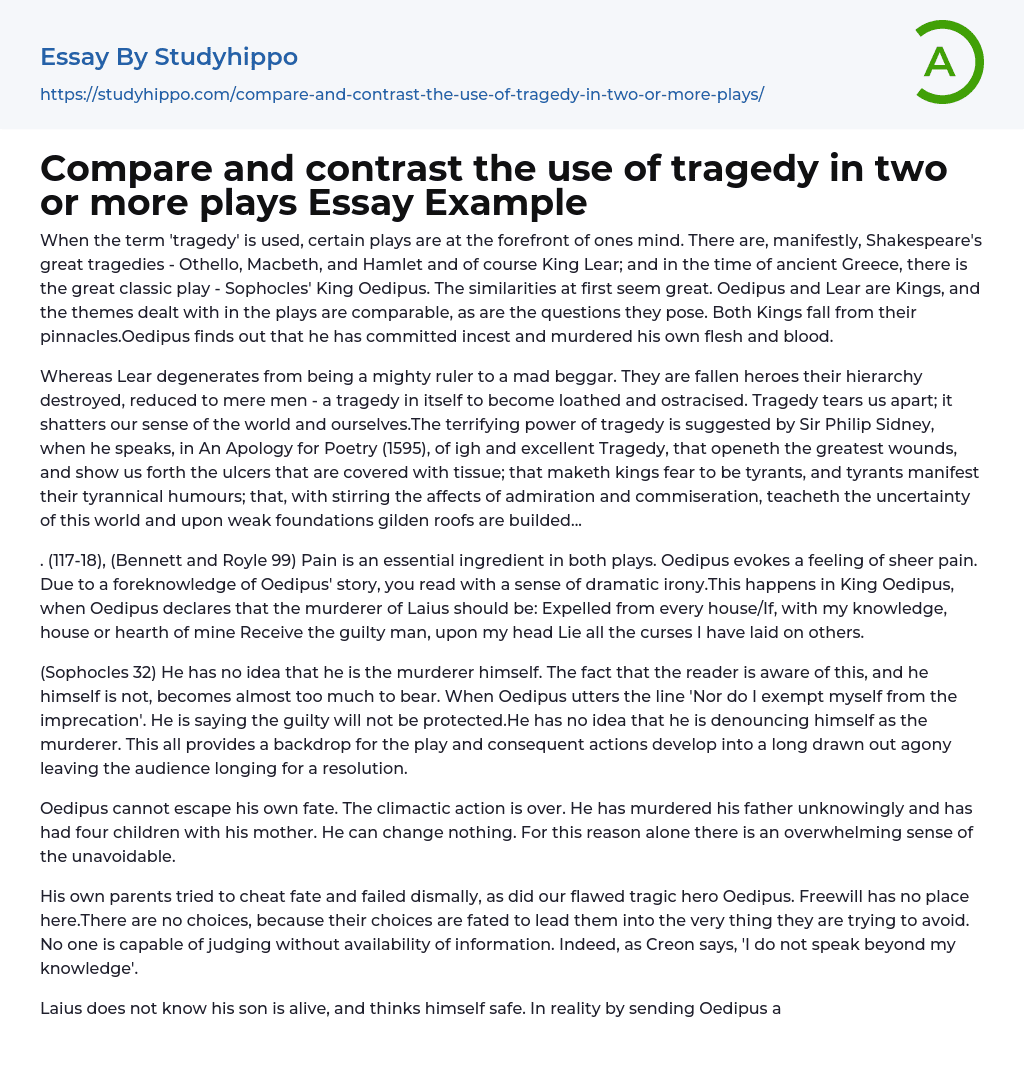

Compare and contrast the use of tragedy in two or more plays Essay Example
When contemplating the notion of 'tragedy', various plays are immediately brought to mind, including Shakespeare's renowned tragedies: Othello, Macbeth, Hamlet and King Lear; as well as Sophocles' classic play from ancient Greek times, King Oedipus. On first inspection, there are numerous similarities between these works. Both King Oedipus and King Lear are rulers who explore comparable themes and pose similar questions. Additionally, both monarchs experience a downfall from their highest position - for example, Oedipus discovers that he has committed incest and murdered his own family members.
King Lear, a play by William Shakespeare, portrays the tragic downfall of once-great characters. The protagonist, Lear, experiences a descent from power to madness and poverty. This loss of status and subsequent isolation is a tragedy in itself. Tragedy has the ability to break our understanding
...of the world and ourselves. Sir Philip Sidney cautioned about this immense power in his 1595 work An Apology for Poetry; he argued that it reveals hidden flaws and weaknesses within individuals while causing rulers to fear becoming tyrants - ultimately teaching us about life's fragility. It is an art form that can evoke strong emotions like admiration or compassion while exposing harsh realities of existence and revealing just how precarious our accomplishments truly are.
Both plays emphasize the importance of pain, as noted in (117-18) and (Bennett and Royle 99). In Oedipus, the audience experiences a heightened sense of pain due to their foreknowledge of the story and the use of dramatic irony. This is exemplified in King Oedipus when Oedipus makes a declaration about punishing Laius' murderer: "Expelled from every house/If, with my knowledge, house or hearth of mine Receive the guilty
man, upon my head Lie all the curses I have laid on others."
(Sophocles 32) It is almost unbearable that Oedipus has no knowledge of being the actual murderer. The reader grasps this fact but Oedipus remains unaware. When he declares 'Nor do I exempt myself from the imprecation', he unconsciously challenges himself as the culprit, but his ignorance prevails. The play's backdrop comprises of this theme, and the following chain of events leads to a long-drawn-out agony for the audience, who crave a resolution.
Despite the climactic action being over and the fact that Oedipus has unknowingly murdered his father and had four children with his mother, he cannot escape his own fate. The sense of the unavoidable is overwhelming due to the fact that he cannot change anything.
In the attempt to avoid a predetermined fate, both our tragic hero Oedipus and his own parents were unsuccessful. This illustrates the absence of freewill in this situation as their choices were predestined to lead them to their inevitable outcome. The lack of information inhibits judgement, as expressed by Creon's statement 'I do not speak beyond my knowledge'.
While Laius is oblivious to his son's survival and assumes he is secure, he actually deprives Oedipus of the understanding of his true lineage by banishing him. This results in Oedipus being unable to choose his own destiny, ultimately leading to tragedy. These extreme circumstances are absent in King Lear.
Lear and Gloucester share a common blindness as they curiously overlook their children's true virtues. The misjudgments they make stem from their respective character flaws, while Oedipus's misjudgments are pre-ordained due to his lack of knowledge. Gloucester unfairly treats Edgar
by trusting his false son, Edmond. Even after being presented with multiple opportunities to see through Edmond's disguise, he falls victim to his illegitimate son's scheme and believes that Edgar is plotting his murder. Gloucester is familiar with both his sons and there is no logical reason to consider Edgar guilty, except for Edmond's word.
Although he should be aware of it if he were thinking clearly, he doesn't entertain the possibility that Edmond is lying because of his preference for his bastard son. He is easily swayed despite not wanting to believe that either son is evil. This misjudgment stems from his character rather than a lack of information. Similarly, Lear places greater importance on Goneril and Regan's proclamations of love over Cordelia's honest declaration of duty, even though Cordelia is just as sincere as they are deceitful.
Being their father, it's natural to assume that he has knowledge of their personalities and can assess them impartially.
- Adaptation essays
- Adventure essays
- Adversity essays
- Aging essays
- Alcohol essays
- Barbie Doll essays
- Beauty essays
- Care essays
- Carpe diem essays
- Change essays
- Chess essays
- Chicken essays
- Choices essays
- Contrast essays
- Crops essays
- Development essays
- Dream essays
- Evil essays
- Experience essays
- Family essays
- Farm essays
- Fire essays
- First Love essays
- Focus essays
- Greed essays
- Hero essays
- Holiday essays
- House essays
- Housing essays
- Humility essays
- Humor essays
- Hypocrisy essays
- Integrity essays
- Law of Life essays
- Life Changing Experience essays
- Life Experience essays
- Lifestyle essays
- Limitations essays
- Love Story essays
- Mother Tongue essays
- Motherhood essays
- My Neighborhood essays
- Myself essays
- Mystery essays
- Narcissism essays
- Never Give Up essays
- Nursing essays
- Object essays
- Opportunity essays
- Peel essays



